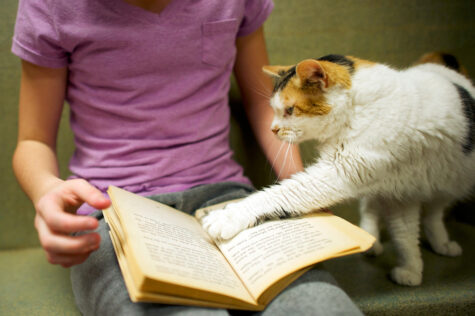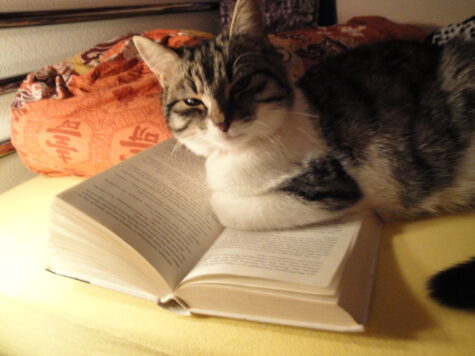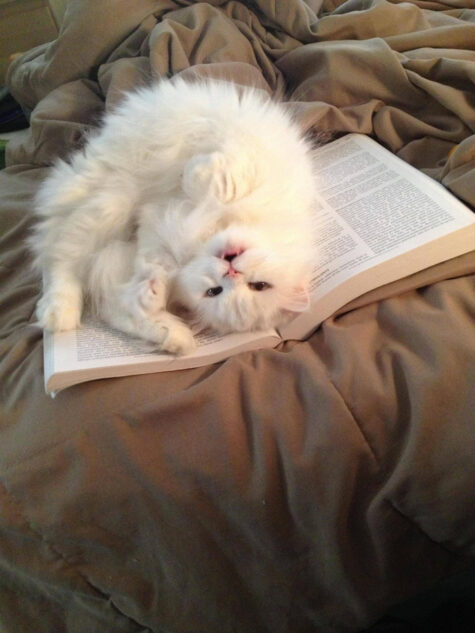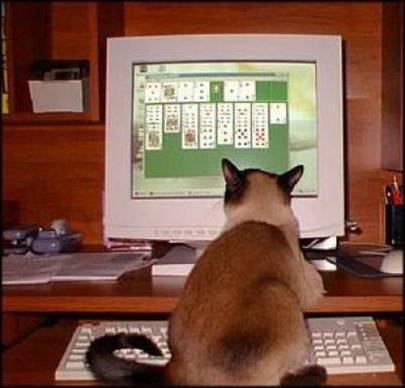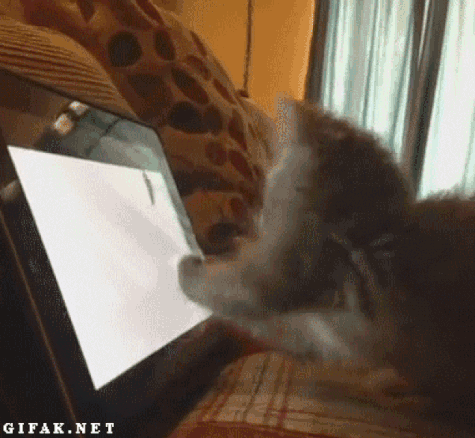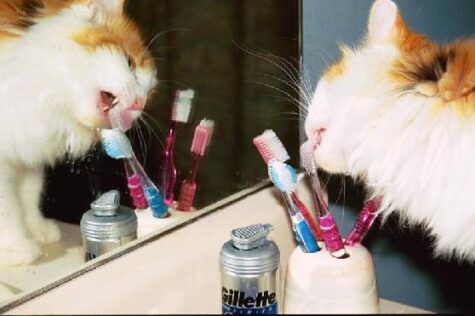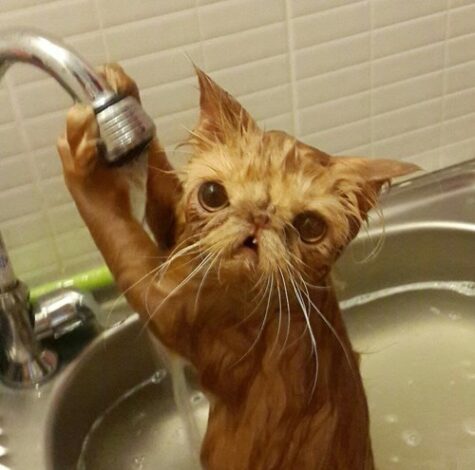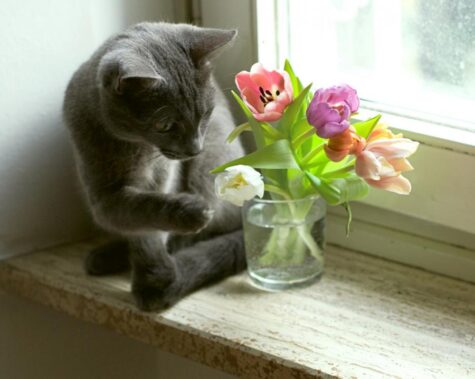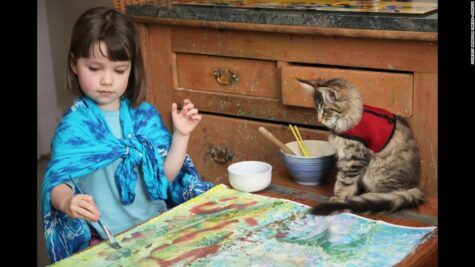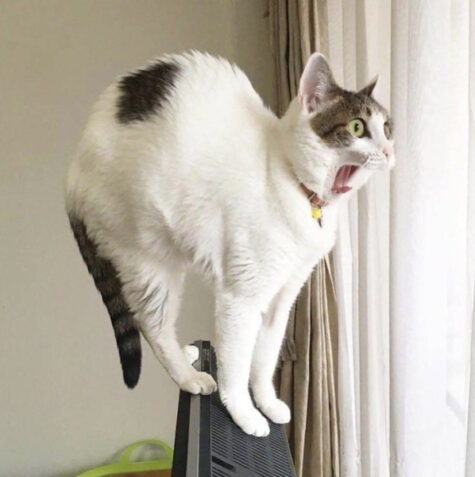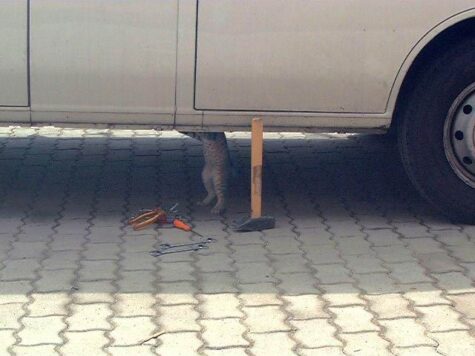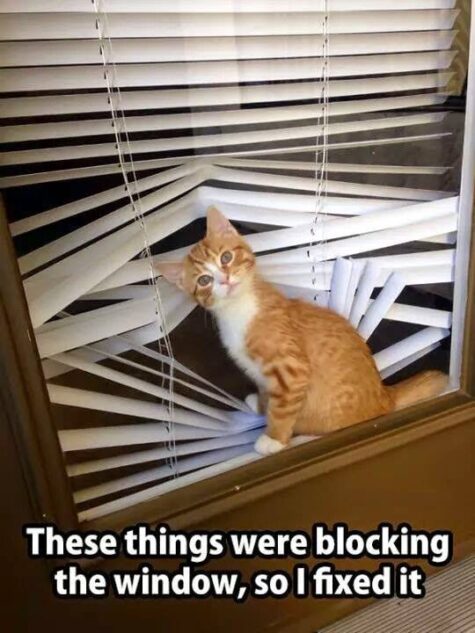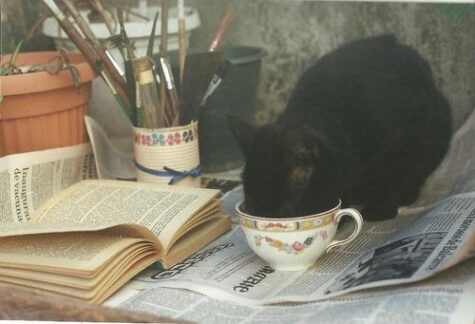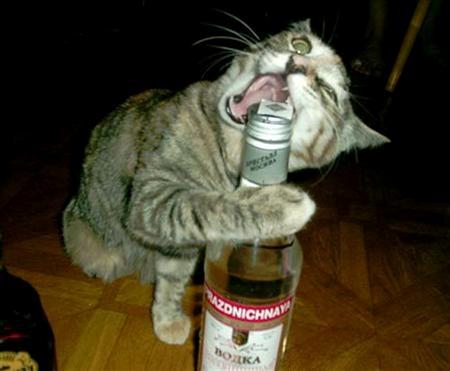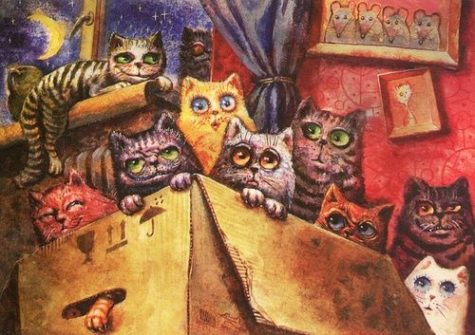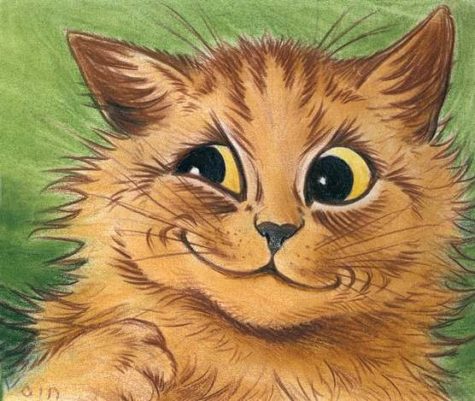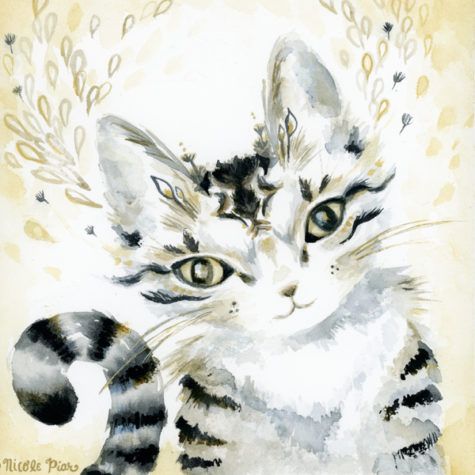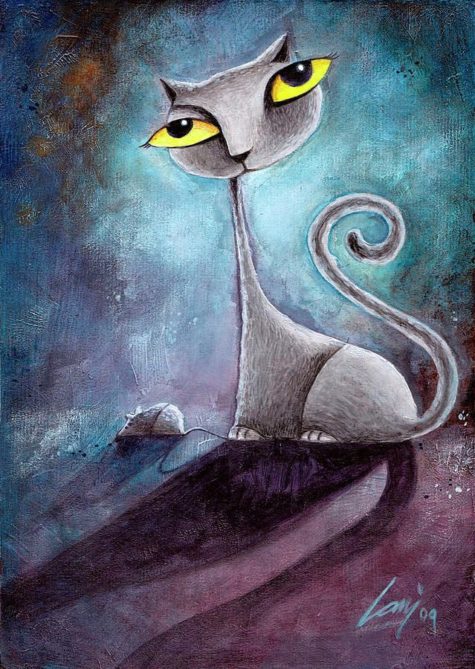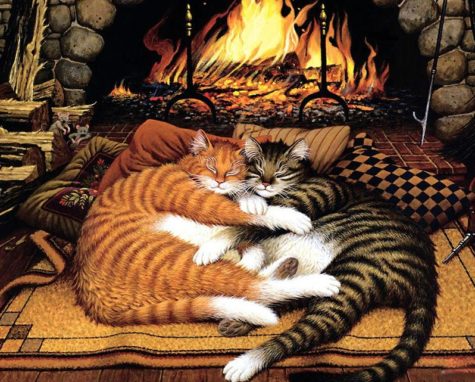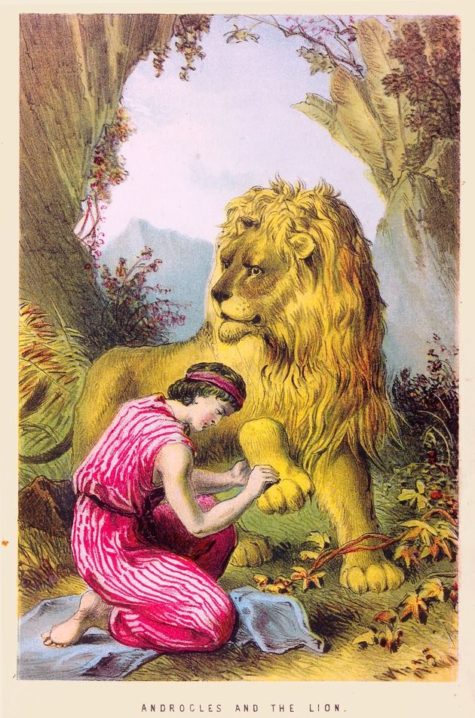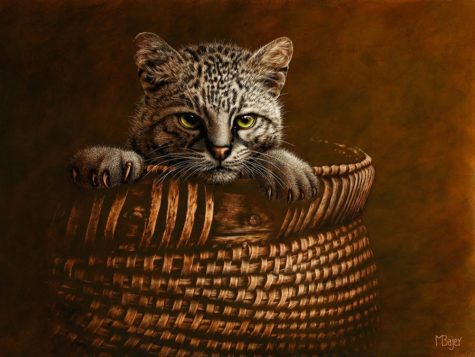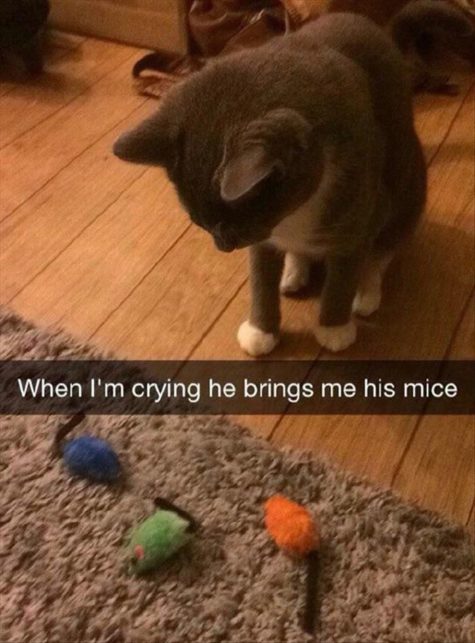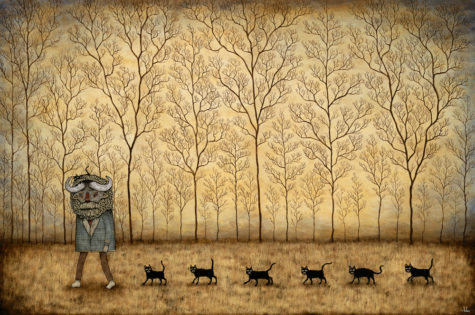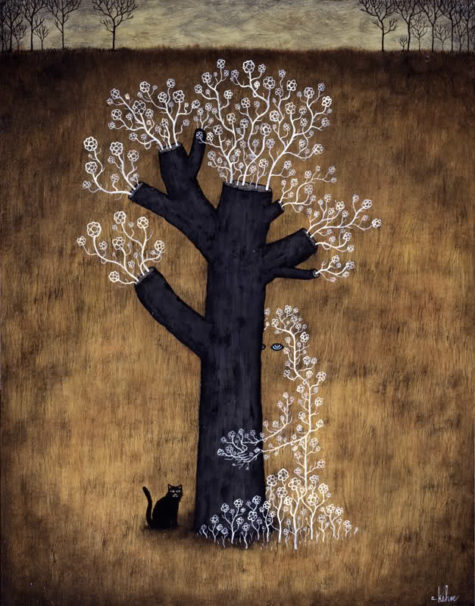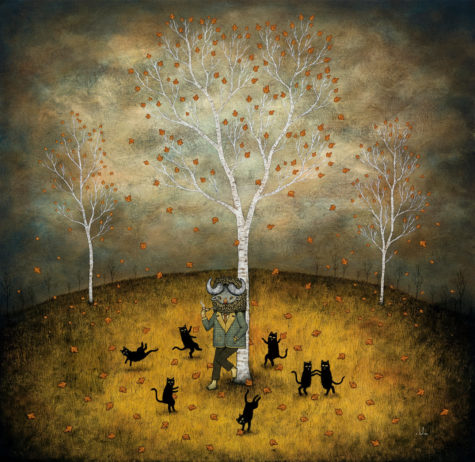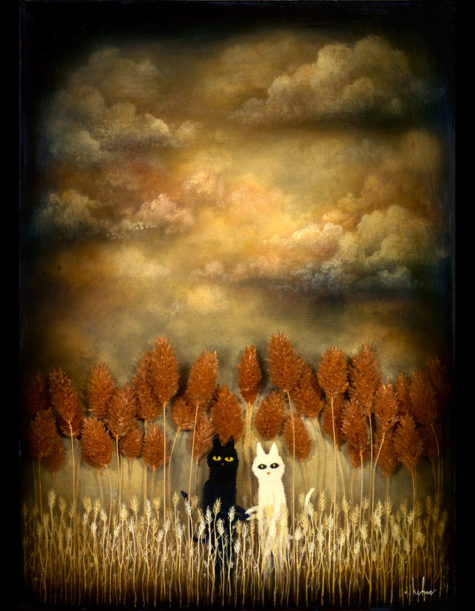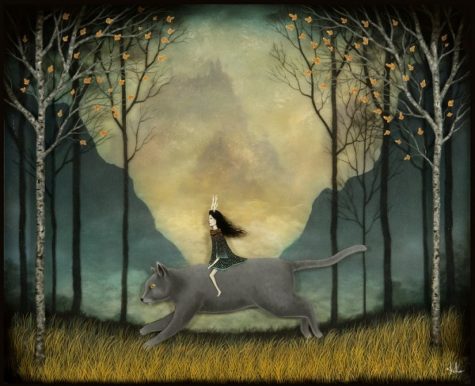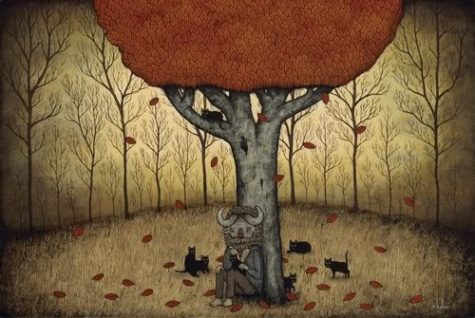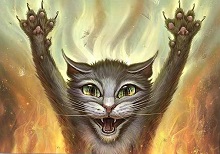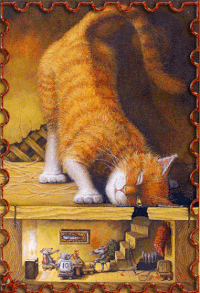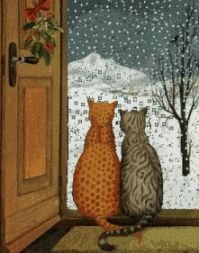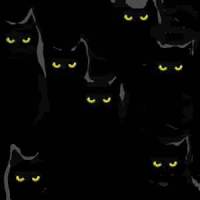Friends
Coworker Cats
Pandemic lock downs mean more people working from home. If you have a cat, you will have a very “helpful” coworker!
Books are especially interesting and require quite a lot of supervision and commentary!
But when it comes to the laptop and PC, cats rule!
And if you need help organizing your briefcase, your coworker cat is more than willing to help.
And the help doesn’t stop there!
Nobody helps with personal hygiene quite as well as your cat!
Even your morning make-up routine gets a helping “hand.”
But wait, there’s more!
You have a flower arranger…
An art class supervisor…
Someone to keep an eye on the neighbors…
Your co-working kitty is there for you when you work out.
Who doesn’t appreciate a coworker who is there to help anytime your car needs repair? Yes. Your cat coworker is a fix-it specialist!
And when it comes to television time?
Your coworker has the skills and determination to successfully monitor what and when you watch TV.
However, when a break is needed, or snacks and drinks are called for, your co-working cat is right there with you.
And at the end of the day?
The Colony of Cats
Long ago, in the days when animals spoke, there lived a community of cats in a deserted house not far from a large town. They had everything they needed for their comfort, they were well fed and well lodged, and an unlucky mouse stupidly ventured in their way, they hunted it for sport. The old people of the town spoke of a time long ago when the whole country was so overrun with rats and mice that all the corn had been eaten up. The people were saved from starvation by cats. It might have been gratitude that the descendants of the cats were allowed to live in peace in their house. No one knows where they got the money to pay for everything, nor who paid it, for all this happened so very long ago.
The cats were rich enough to keep a servant to the things the cats could not – the housework and cooking the meat (for they did not condescend to eat it raw). The cats were very difficult to please about the housework and most women quickly tired of living alone with only cats for companions so they never kept a servant long. It became a saying in the town, when anyone found herself reduced to her last penny: “I will go and live with the cats”.
Lizina was unhappy at home; her widowed mother preferred Lizina’s older sister and often neglected Lizina while spoiling her sister. If Lizina complained, her mother beat her. One day Lizina could stand it no longer and she declared she was going to live with the cats. Her mother was all too pleased to see Lizina go and chased her away with the broom.
Lizina ran all the way to the cats’ house. The cats’ cook had left them that very morning, with her face all scratched from a quarrel with the head of the cats’ house. Lizina was therefore very welcome and she set to work at once to prepare the dinner, worried that she would not be able to satisfy her employers.
She was frequently hindered by a constant succession of cats who appeared one after another in the kitchen to inspect the new servant; one was in front of her feet, another upon a chair, a third sat on the kitchen table and several more prowled about the kitchen. They all purred, pleased with their new maid, but Lizina did not yet understand their language, and often she did not know what they wanted her to do.
However, as she was a kind-hearted girl, she set to work to pick up the little kittens which tumbled about on the floor, she patched up quarrels, and nursed on her lap a big old tabby with a lame paw. This made a favorable impression on the cats, and it was even better after a while, when she had had time to grow accustomed to their strange ways. Never had the house been kept so clean, the meats so well served, nor the sick cats so well cared for.
After a while, the house of cats had a visit from an old cat, whom they called Father Gatto. Father Gatto by himself in a hilltop barn and sometimes came down to inspect the little colony. He was much taken with Lizina, and asked the cats “Are you well served by this nice, black-eyed little person?” to which they replied “Yes Father Gatto, we have never had so good a servant!” Each time he visited, Father Gatto asked the same question and, each time, the cats gave the same answer. However, after a time, the observant old cat noticed that the little maid was looking ever more sad.
“What is the matter, my child? Has any one been unkind to you?” he asked one day, when he found Lizina crying in her kitchen.
Lizina sobbed “No Father Gatto! They are all very good to me, but I long for news from mother and my sister at home.”
Old Gatto, being a sensible old cat, understood her feelings and said, “You shall go home and you need not come back here unless you please. But first you must be rewarded for all your kind services to my children. Follow me down into the inner cellar, where you have never yet been, for I always keep it locked and carry the key away with me.”
Lizina looked round her in astonishment as they went down into the great vaulted cellar underneath the kitchen. Before her stood the big earthenware water jars, one full of oil, the other full of a liquid that shone like gold.
“Which of these jars shall I dip you in?” asked Father Gatto, with a toothy, whiskery grin.
Lizina looked at the two jars and finally replied, “In the oil jar,” for she did not think herself worthy of dipping in gold.
Father Gatto replied, “Oh no, my child, you deserve better than that!” and seizing her in his strong paws he plunged her into the liquid gold.
Lizina came out of the jar shining gold from head to foot, only her pink cheeks and long black hair keeping their natural color. Father Gatto purred loudly with satisfaction.
“Now you may go home to see your mother and sister,” said old Gatto, “but take care that if you hear the cock crow you must turn towards it, but if you hear the ass bray, you must look the other way.”
The little maid gratefully kissed Gatto’s white paw and set off for home. Just as she got near her mother’s house the cock crowed, and quickly she turned towards it. Immediately a beautiful golden star appeared on her forehead, crowning her glossy black hair. At the same time the ass began to bray, but Lizina took care not to look into the donkey field where the donkey was grazing. Her mother and sister, who were in front of their house, cried out in astonishment when they saw Lizina. They cried out in even greater admiration when she took her handkerchief from her pocket and drew out also a handful of gold.
For some days the mother and her two daughters lived very happily together, for Lizina had given them everything she had brought away except her golden clothing, for that would not come off, in spite of all the efforts of her jealous sister. The golden star could not be removed from her forehead, but all her gold pieces had ended up with her mother and sister.
“Maybe I will go and see what I can get out of the pussies,” said Peppina, Lizina’s older sister, taking Lizina’s basket and fastening her pockets into her own skirt, “I should like some of the cats’ gold for myself,” and left the house before the sun rose. The cat colony had not yet taken another servant, knowing they could never get one as good as Lizina, but when they heard that Peppina was her sister, they all ran to meet her.
“She is not at all like Lizina,” whispered the kittens among themselves.
“Hush!” the older cats said, “not all servants can be pretty.”
But silently they all agreed she was not at all like Lizina. On her very first day she shut the kitchen door in the face of the tom-cats who used to enjoy watching Lizina working. A young and mischievous cat who jumped in by the open kitchen window and onto the table got such a blow with the rolling-pin that he yelled for an hour.
Each day, the household became more and more aware of its misfortune. The work was as badly done and the servant was surly and disagreeable. Heaps of dust collected in the corners of the rooms and cobwebs hung from the ceilings and in front of the window-panes. The beds were hardly ever made and the feather beds, loved by the old and feeble cats, were never shaken or plumped up. At Father Gatto’s next visit he found the whole colony in a state of uproar.
“Caesar has one paw so badly swollen that it looks as if it were broken,” said one. “Peppina kicked him with her great heavy boots. Hector has an abscess in his back where a wooden chair was flung at him. Agrippina’s three little kittens have died of hunger beside their mother, because Peppina forgot them in their basket up in the attic. There is no putting up with the creature – do send her away, Father Gatto! Lizina herself would not be angry with us, she must know very well what her sister is like.”
“Come here,” said Father Gatto, in his most severe tones to Peppina. He took her down into the cellar and showed her the same two great jars. “In which of these shall I dip you?”
Peppina answered at once, “In the liquid gold,” for she was not at all modest and was greedy as well as unkind.
Father Gatto’s growled angrily, “You have not deserved it!” and flung her into the jar of oil, where she was nearly suffocated. When she came to the surface screaming and struggling, the vengeful cat seized her again and rolled her in the ash-heap on the floor. When Peppina rose, dirty, blinded and disgusting to behold, he pushed her out of the door, saying, “Begone and when you meet a braying ass be careful to turn your head towards it.”
Stumbling and raging, Peppina set off home. She was within sight of her mother’s house when she heard the donkey braying in its field. Quickly she turned her head towards it and a donkey’s tail sprang from her forehead. She ran the rest of the way home as fast as she could, shrieking in anger and despair.
It took Lizina two hours and two cakes of soap to get rid of the oil and ashes that Father Gatto had covered Peppina in, but the donkey’s tail was impossible to get rid of – it was as firmly fixed on Peppina’s forehead as was the golden star on Lizina’s. Their furious mother blamed Lizina for all her sister’s woes and beat the girl mercilessly with the broom, then she took her to the well and lowered her into it, leaving poor Lizina at the bottom of the well weeping and crying for help.
Before all this happened, however, the king’s son had passed the house and had seen pretty Lizina sitting sewing in the parlour. He had passed the house several times to admire the golden girl with the pretty pink cheeks and the long black hair. Finally, he summoned up the courage to ask her hand in marriage and Lizina had gladly accepted. The next morning, when the prince arrived to claim his bride, he found her wrapped in a large white veil.
“This is how maidens are received from their parents’ hands,” said the mother, who hoped to make the king’s son marry Peppina in place of her sister, and had fastened the donkey’s tail round her head like a lock of hair under the veil.
The prince was young and shy, so he made no objections, and seated Peppina in the carriage beside him. Their way led past the old house inhabited by the cats, who had heard that the prince was to marry a beautiful golden maiden with a star on her forehead and knew it must be their own dear Lizina. They were all at the window and as the carriage slowly passed in front of the old house, the cats began to sing “Mew, mew, mew! Prince, look quick behind you! In the well is fair Lizina, And you’ve got nothing but Peppina!”
When he heard this the coachman, who understood the cat’s language better than the prince, stopped his horses and asked if the prince had understood what the cats were singing. The prince threw back the veil and discovered the puffed-up, swollen face of Peppina, with the donkey’s tail twisted round her head.
“Traitress!” he exclaimed and ordered the carriage to be turned round. He drove the greedy elder daughter, quivering with rage, back to the old woman who had tried to deceive him. With his hand on the hilt of his sword he demanded Lizina in so commanding a voice that the mother hastily pulled Lizina from out of the well. Lizina’s clothing and her star shone so brilliantly that when the prince led her home to his father, the whole palace was lit up.
The next day Lizina and the prince were married and all the cats, from tiny kittens under their mothers’ bellies to Old Father Gatto himself, were present at their wedding.
Found at: Moggy Cat
The War of the Wolf and the Fox
There was once a man called Simon and his wife, Susan, who had an old cat and an old dog.
One day Simon said to his wife “Why should we keep our old cat any longer? She never catches any mice and is so useless that I should drown her.”
His wife replied, “Don’t do that; I’m sure she could still catch mice.”
“Rubbish,” replied her husband “The mice could dance on her and she’d never catch one. As soon as i find her i shall drown her.”
Susan was most unhappy about this and so was the old cat, who had been hiding behind the stove and had overheard the conversation. When Simon went off to work, the poor cat meowed so pitifully, and looked up so pathetically at Susan that the woman opened the door and told the cat to flee for her life before Simon returned home.
The poor old cat ran as quickly as her old legs would carry her into the wood, and when Simon came home for dinner, his wife told him that the cat had gone missing and had probably crawled away to die of old age.
“So much the better,” her husband said, “It saves me the bother of drowning her. However, what are we to do with the old dog? He is deaf and nearly blind; he barks when there is no need, and he fails to bark when there is need. The best thing I can do with him is to hang him.”
Soft-hearted Susan replied, “Please don’t. I’m sure he’s not as useless as you think.”
But her husband just retorted “The yard could be full of thieves and he’d never discover it. As soon as I find him he shall be hanged and we’ll be rid of him.”
Susan was most unhappy at his words, and so was the dog, who had been hiding under a chair in the corner of the room and who had heard everything. As soon as Simon had gone back to work, the old dog stood up and howled so touchingly that Susan quickly opened the door and told the dog to flee for his life.
The poor old dog fled into the wood with his tail between his legs and when Simon returned, his wife told him that the dog had run off.
“That’s lucky for him and lucky for me for it saves me the bother of tying a rope to hang him with,” said Simon.
Susan sighed, for she had been very fond of the dog and the cat and there was now no-one at home to keep her company while Simon was at work.
It happened that the cat and dog met each other in the woods and though they had not been the best of friends at home, having kept to their own tasks, they were glad of each other’s company. They sat down under a holly tree and told each other the tale of how they had ended up turned out of home.
Presently a fox passed by. Seeing the pair sitting together so sadly, the fox asked what they were grumbling about and why they were so sad.
The cat replied, “I have caught many mice in my day, but now that I am old and tired, my master wants to drown me and be rid of the trouble of feeding me.”
The dog said, “Many a night have I watched and guarded my master’s house, but now that I am old and deaf, he says I am no more use and he wants to hang me and be done with me.”
The fox answered, “That’s the way of humankind, ungrateful creatures that they are. I’ll help you to get back into your master’s favor if you first help me in my own troubles.”
The dog and cat promised to do their best, and the fox continued, “The wolf has declared war against me. He is at this moment marching to meet me in company with the bear and the wild boar, and tomorrow there will be a fierce battle between us. I need staunch comrades to stand against the wolf with me.”
“All right,” said the dog and the cat, “we will stand by you. If we are killed, as we are sure to be, it is at any rate better to die on the field of battle than to perish ignobly at home, drowned like a witch and hanged like a thief.”
The fox sent word to the wolf to meet him at a certain place, and the fox, dog and cat set forth to the appointed place. The wolf, the bear and the wild boar arrived on the spot first. When they had waited some time for the fox, the dog, and the cat, the bear said, “I’ll climb up into the oak tree and see if they are coming.”
The first two times, the bear saw nothing, but on the third time of looking, the bear said “I see a mighty army in the distance, and one of the warriors has the biggest lance you ever saw!”
This was the cat, who was marching along with her tail erect. So they laughed and jeered and the bear said, “The enemy won’t be here at this rate for many hours to come, so I’ll just curl myself up in the fork of the tree and have a nap.”
Seeing the bear napping, the wolf curled up at the foot of the tree to nap as well. The boar buried himself in loose leaves until only one ear was visible.
By and by, the fox, the cat and the dog arrived. When the cat saw the boar’s ear, she pounced upon it, thinking it was a mouse in the leaves. The boar was so pained and startled that he fled squealing in terror. The poor old cat was even more startled and, spitting with terror, she scrambled up into the fork of the tree, and right into the bear’s face.
The bear was just as startled as the boar. Growling and swiping with his paws, he lost his balance and fell out of the tree. He landed on the wolf and killed it stone dead. The wolf died with such a yelp that the bear ran off into the woods, certain a whole army of foxes was after him.
The bargain having been kept, the fox told the dog and the cat to take him to the cottage where they had lived with Simon and Susan. On their way there, the fox caught a score of mice. When they reached the cottage he put them all on the stove and said to the cat, “Now go and fetch one mouse after the other and lay them down before your master.”
The cat did exactly as the fox told her and when Susan saw this she said to her husband, “Our old cat has returned home and what a lot of mice she has caught!.”
“Perhaps she is not so useless after all,” said Simon, “I never thought the old cat would ever catch another mouse.”
His wife replied “I always said our cat was an excellent creature, but you men always think you know best.”
Meanwhile, the fox said to the dog, “Your master has just killed a pig. When it gets a little darker, you must go into the courtyard and bark with all your might.”
As soon as it was dusk, the old dog began to bark loudly.
Susan said to her husband, “Our dog must have come back – I hear him barking with all his might. Do go out and see what’s the matter – perhaps thieves are stealing our sausages.”
But Simon answered, “The old brute is as deaf as a post and is always barking at nothing,” and he refused to go and find out what was happening.
The next morning, Susan got up early to go to town, and she thought she would take some sausages to her aunt who lived there. When she went to her larder, she found all the sausages gone and a great hole in the floor. She called out to her husband, “I was right after all. Thieves have been here last night, and they have not left a single sausage. Oh! if you had only got up to see what our old dog was barking at when I asked you to!”
Simon scratched his head and said, “maybe he’s not so useless after all. I never believed the old dog was so quick at hearing.”
His wife replied, “I always told you our old dog was the best dog in the world, but as usual you thought you knew so much better. You men always think you know best.”
So the dog and the cat settled back into their home and every time Simon suggested they were not earning their keep, his wife would stare at him until he admitted that the animals were not so useless after all. And the fox scored a point too, for he had carried away the sausages.
Found at: Moggy Cat
The Witch’s Cat
Once upon a time there was a peasant whose wife had died and left him with two children; a twin boy and a twin girl. He decided to marry again and over the next few years his new wife had several children of her own, but she neglected and beat the twins and wanted nothing better than to get rid of them. Finally, she had a wicked thought and decided to send them out into the great gloomy wood where a wicked witch lived.
One morning she told the twins, “You have been such good children that I am sending you to visit my granny, who lives in a dear little hut in the wood. You will have to wait upon her and serve her, but she will give you the best of everything in return.”
The children left the house together, but the little sister said to her brother, “First we will visit own dear grandmother and tell her where our step-mother is sending us.” Which they did.
Their grandmother cried, “I wish I could help you, but I am old and poor. Your step-mother is sending you to the wicked witch of the wood. Listen to me – be civil and kind to everyone, never say a cross word to anyone and never touch a crumb belonging to anyone else. Help may be sent to you after all.”
She gave them a bottle of milk, some ham and a loaf of bread and they set out for the wood. There they saw a queer little hut and knocked on the door.
“Who’s there?”‘ snarled the witch in an awful voice.
“Good-morning, granny. Our step-mother has sent us to wait upon you, and serve you.”
“If I am pleased with you, I’ll reward you. If not, I’ll cook you in my oven! See that you work hard!” growled the witch.
She set the girl down to spin yarn and she gave the boy a sieve in which to carry water from the well, then she herself went out into the wood. The girl sat weeping at the spinning wheel because she didn’t know how to spin. Presently she heard the pattering of hundreds of little feet, and from every hole in the hut mice came squeaking: “Don’t cry little girl. We’ll help you if you give us some of your bread.”
The girl gave them some the bread and the mice began to spin the yarn. The mice told her that the witch’s grey cat would tell her how to escape if she gave it some of her ham. She went to find the cat, but instead she found her brother sobbing because the water kept running out of the sieve. Then they heard rustling wings and a flight of wrens alighted and said said, “If you give us some crumbs we’ll help you keep that water in the sieve.”
So they gave their remaining crumbs of bread to the wrens and the wrens showed the boy how to fill the holes of the sieve with clay to make it water-tight. They carried the water inside the hut without spilling a drop. Inside the hut they found the cat curled up on the floor, so they stroked her and gave her some ham and asked, “Pussy, grey pussy, how are we to get away from the witch?”
The cat thanked them for the ham and gave them a handkerchief and a comb. She told them that when the witch chased them, as she certainly would, they must throw the handkerchief on the ground and run as fast as they could. As soon as the handkerchief touched the ground, a deep broad river would spring up to hinder the witch’s progress. If the witch managed to cross the river, they must throw the comb behind them and run for their lives, for where the comb fell a dense forest would start up, which would delay the witch so long that they would be able to get safely away. The cat had scarcely finished speaking when the witch returned.
“You have done your work well enough for today,” she grumbled, “but tomorrow you’ll have something more difficult to do, and if you fail it will be straight into the oven with you.”
The terrified children barely slept a wink on their pile of straw. In the morning the witch gave the girl two pieces of linen to weave before night, and gave the boy a pile of wood to cut into chips. Then she went out into the wood. As soon as she was out of sight, the children took the comb and handkerchief and ran hand-in-hand away from the hut.
First they met the witch’s fierce watch-dog, but they threw their remaining bread and ham to him and he let them go past. Then they were hindered by the tangled birch-trees, but little sister tied the twigs together with her ribbons, and they passed safely. At last they reached open fields. Meanwhile, the cat was busy weaving the linen and tangling the threads as it wove. When the witch returned to see how the children were getting on she crept up to the window and whispered, “Are you weaving, my little dear?”
“Yes, granny, I am weaving,” answered the cat.
The angry witch saw that the children had escaped and began beating the cat. “Why did you let the children leave the hut? Why did you not scratch their eyes out?”
The cat hissed, “I have served you all these years and you never even threw me a bone, but the dear children gave me their own piece of ham.”
Then the witch was furious with the watch-dog and with the birch-trees for letting the children escape. The dog told her “I have served you all these years and you never gave me so much as a hard crust, but the dear children gave me bread and ham.” The birch tree rustled its leaves and said “I have served you longer than I can say with twigs for your broom, and you never tied a bit of twine even round my branches, but the dear children bound them up with bright ribbons.”
The witch mounted on her broom and set off after the children, her broom sweeping the ground as it went. The children heard the sound of the broom close behind them and they threw the handkerchief over their shoulder. In an instant, a deep, broad river flowed behind them. It took the witch a long time to find a safe place to cross, but at last she found a place and she chased faster than before. When the children heard the broom behind them, they threw the comb down on the ground. In an instant, as the witch’s cat had promised, a dense forest sprung up. It was so thick and tangled that the witch found there was nothing for it but to turn round and go back to her hut.
The twins ran until they reached their own home where they told their father what had happened. In anger, he drove their step-mother out of the house forever and he never again let a stranger into the house.
Found at: Moggy Cat
A Cat and Mouse Story
A cat once became such good friends with a mouse that she invited the mouse to live with her. The mouse agreed to move in and to share with the housekeeping. However they agreed not to leave the house each without the other unless by mutual agreement. “We must provide for the winter or else go hungry,” said the Cat, “but it is too dangerous for you to go looking for food in case you run into a mouse-trap.”
The cat’s advice was followed and they bought a little pot of fat, but they did not know where to put it. After a long discussion, the Cat said, “We can hide it safely in a corner of the church where no-one will disturb it. We won’t touch it until we need it.”
So they hid the little pot of fat in the church, but it wasn’t long before the cat had a great longing to lick some fat. She said to the Mouse, “My cousin has just had a little son, white with brown spots, and she wants me to be the godmother. I will go to the christening while you look after the house – it would be dangerous for you to come with me as the other cats would surely eat you!”
“Certainly,” replied the Mouse, “and when you eat anything good, think of me. If possible, I should very much like a drop of the red christening wine.”
But the Cat had no cousin, and had not been asked to be godmother. She went straight to the church and licked the top off the little pot of fat. Then went walking and sunning herself on the roofs of the town, licking her lips whenever she thought of the little pot of fat. When evening came, she returned home.
“Did you have an enjoyable day?” the mouse asked her.
“Indeed,” said the cat, “It all went very well.” And of course, that was the truth.
“What was the child’s name?” asked the mouse.
“Top Off,” replied the cat dryly.
“What a curious name!” exclaimed the mouse, “Is it a traditional name in you family?”
“What’s odd about the name?” the cat asked, blinking, “It’s no more curious than ‘Breadthief’ as your godchild is called.”
Soon after, the cat had another great longing for some fat and she once more asked the mouse to take care of the house, “I have been asked a second time to be a godmother, and of course I cannot refuse as the child has a white ring around its neck.”
The kind mouse agreed and the untruthful cat slunk under the town wall to the church where she ate up half of the pot of fat. “Nothing tastes better than what one eats by oneself,” she said, greatly pleased with her day’s work. Then she went sunning herself on the town roofs before returning home.
“What was this child named?” asked the mouse.
“Half Gone,” answered the cat.
“Halfgone?!” exclaimed the mouse, “What a name! Why I have never heard such a name in my life.”
Soon after, the cat once more had a great longing for some fat and she said to the mouse, “All good things come in threes and I have been asked to be godmother to my cousin’s third child as well. It is coal black and has snow white paws, but not a single white hair on its body. Such a thing only happens once in two years, so you will let me go out?”
“Topoff! Halfgone!” said the mouse, “Such curious names and they make me very thoughtful.”
“Oh, you sit here at home in your dark grey coat and your long tail,” said the cat, “and it makes you fanciful. That comes of not going out in the day!”
The mouse cleaned and swept the house while the cat was gone, but the untruthful cat ate up every last bit of the fat and said, “When it is all gone one can be at rest” before returning home sleek and satisfied.
“And what did they name this child?” asked the mouse, “Something as curious as the others?”
“It won’t please you any better,” the cat told her, “they called him Clean Gone.”
“Cleangone!” exclaimed the mouse, “Why don’t believe such a name exists! Cleangone indeed! What can it mean?”
The mouse shook her head and curled up to sleep. From that time one, no-one asked the cat to be godmother, but when the winter came and there was no food to be got outside, the mouse remembered their precious pot of fat safely hidden in the church and said, “Come, cat, let’s go to our pot of fat – it will taste very good.”
“Indeed,” answered the Cat, “it will taste as good to you as if you stretched your thin tongue out of the window,” meaning that empty air has no taste at all.
When they reached the church, they found the pot in its place, but quite empty and the mouse guessed what had been happening each time the cat had gone to a christening.
“Now I know what has happened, you false friend!” she cried, “First you ate the top off, then half of it gone and then …”
“be silent!” hissed the cat, “Another word and I will eat you up as well.”
But the word “Cleangone” was already on the poor mouse’s tongue, and scarcely was it out than the cat pounced on her and swallowed her whole.
“All gone,” said the cat to herself. You see that is the way of the world.
Found at: Moggy Cat
The Cat in the Fireplace
Once upon a time there lived a man and his wife in an old cottage. The couple rarely had enough money for comforts and sometimes not even enough money for bread or for wood for the fire. Their only companion was a black tomcat with great golden eyes.
One evening, in the cold winter, the couple watched their small fire burn out. They had no more wood to put on the fire as the weather was too bad for them to venture out to collect fallen branches. So they sat huddled in blankets, lamenting their bad luck and poor station in life, by the ashes until the ashes had grown cold and the couple had fallen into despair.
Then the woman noticed two embers still glowing and flickering at the back of the fire. Though they had no wood with which to kindle a fire, the cheerily glowing embers made them feel warmer and less sad and they began to talk of happier things. Late into the night they talked of happier times and began to be more optimistic about the future. But eventually, even the two glowing coals seemed to be burning out.
“I’ll blow them into life,” said the man and he blew gently into the fireplace.
With a great screech, their black tomcat shot up out of the fireplace and up the chimney. The glowing, flickering embers had not been embers after all, but had been the cat’s eyes glowing and blinking back at the couple as they talked. As the cat had begun to fall asleep the embers had seemed to die.
The man and his wife had been kept warm through the night by their own optimism and realized that their greatest possessions were not wealth and objects, but each other and their cat.
Found at: Moggycats Cat Pages
Androcles and the Lion
This is the story of Androclus according to Apion. Apion was a 1st century AD. Greek grammarian and commentator who claimed to be an eyewitness to events. The tale has also been told as “Andy Rockles and the Lion.”
One day in Rome the people were being entertained by the fighting of several strange beasts, and principally of lions of an unusual size. Amongst the lions, there was one who stood out from the rest through his furious deportment, his size and strength and his loud and dreadful roaring. Amongst the other slaves being made to fight the lions was one called Androclus of Dacia. Androclus, belonged to a Roman lord from the consulate.
On seeing Androclus, the huge lion suddenly stopped, as if wondering what to do. It then softly approached the slave in a gentle and peaceable manner, as if to greet him. The lion then began to wag his tail, like a friendly dog, and nuzzled and licked the hands and thighs of the poor slave who was almost dead with fear. Recovering his composure, Androclus appeared to recognize the lion and caressed it to great applause from the spectators. The emperor demanded to know the cause of so strange an event and called the slave to him.
Androclus explained that his master, the proconsul in Africa, was cruel and beat him daily. Androclus had run away and, afraid to take refuge in towns, had hidden in a sandy, uninhabited area, resolving to kill himself if he could not support himself. During the heat of noon, he sheltered in an almost inaccessible cave.
Soon afterwards, a lion entered the cave with one foot wounded and bloody, complaining and groaning with pain. Androclus had been terrified, but the lion had spotted him and approached gently, displaying its wounded paw as if asking for help. Androclus drew out a great splinter and, growing a little more familiar with the lion, squeezed dirt and gravel out of the wound then wiped and cleansed it.
Now much more comfortable, the lion fell asleep with its paw still in Androclus’ hand. From then on, the slave and the lion lived together in the cave for three whole years, eating the flesh of the beast that the lion killed. The lion allowed Androclus the best pieces, which the slave roasted in the sun.
Androclus eventually grew tired of his wild and brutish life. While the lion was hunting, Androclus escapred from the cave and, three days later, was taken by Roman soldiers. The soldiers returned him to the proconsul who condemned me to die in combat with wild beasts. It seemed that the lion was also captured and had recognised and greeted Androclus in the arena.
That was the story that Androclus told the emperor and which was retold to the people. Androclus was absolved from his sentence and set free. The lion was, by order of the people, presented to him. The people later saw Androclus leading this lion, in nothing but a small leash, from tavern to tavern at Rome, and receiving what money everybody would give him, the lion being so gentle, as to allow itself to be covered with the flowers that the people threw on it.
How Cats Came To Live With The Hopi
A long time ago a Hopi boy went out to hunt. It was winter and the snow lay on the ground in the valley where he searched for game. To his surprise he found some tracks in it that were like no tracks he had ever seen before, and he followed them. The tracks led out of the valley and ended at a large rock.
The boy put his hand into the opening under the rock and pulled out a strange animal by its leg. He tied its legs together and started back with it to his village. When he reached home, he asked his father what the animal was. The boy’s father replied that it was a cat and that it ate mice, rats and rabbits.
On hearing this, the boy went back into the valley and caught a rabbit which he brought back to the cat. He kept the cat confined in a niche in the wall of his home and continued to feed it for four days. In this way the cat became tame and cats have lived in Hopi houses ever since.
Found at: Moggycats Cat Pages

